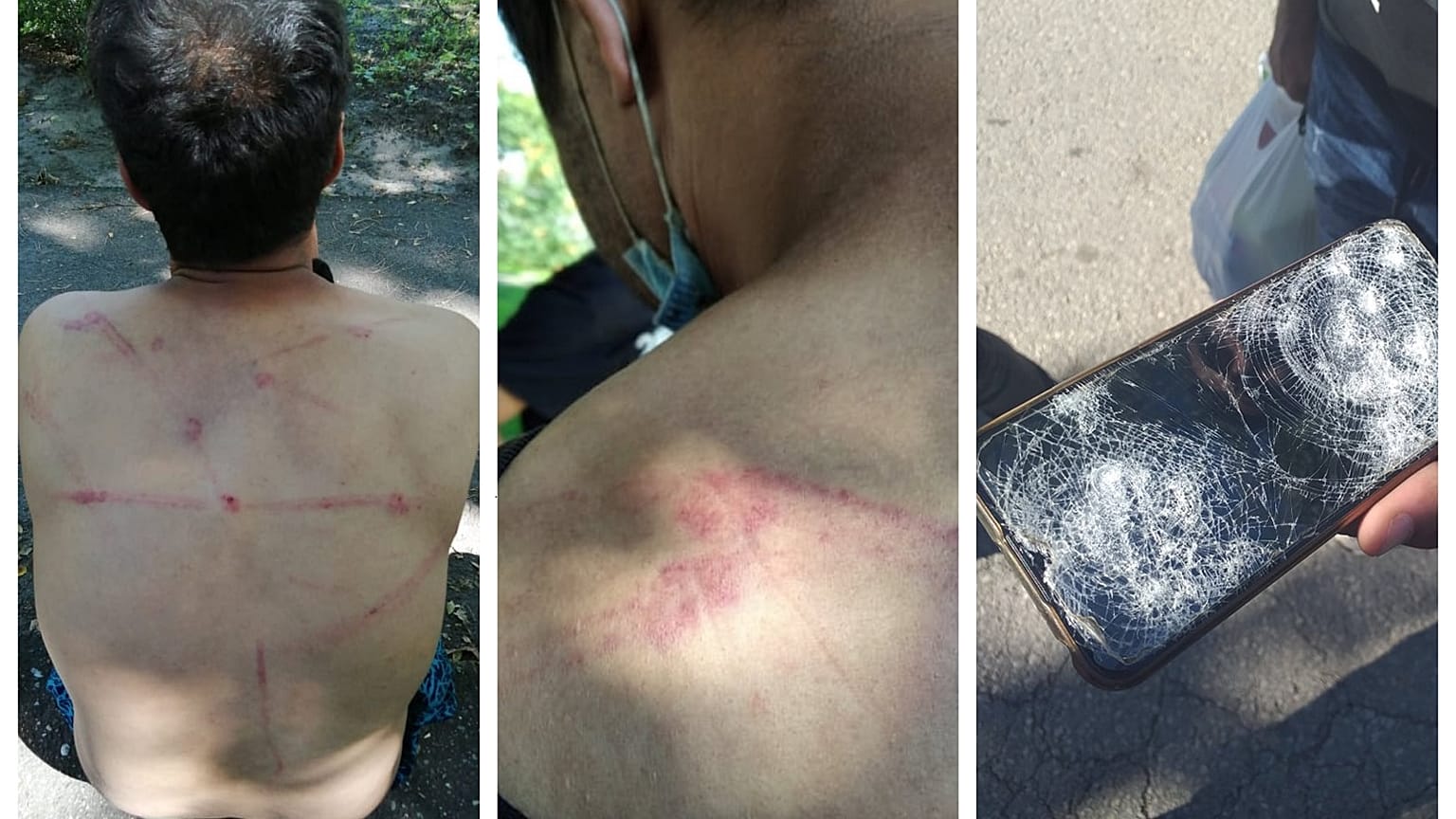Migrants have shared testimonies of their alleged physical abuse by Romanian border guards, who illegally expelled them back to Serbia.
On August 19, six Syrians and an Egyptian arrived on the doorstep of a Belgrade NGO. Seeking help, they told staff of how they were violently pushed back to Serbia by Romanian border guards. One of them had an amputated leg; he alleged Romanian officers used his own crutches to beat him.
 ADVERTISEMENT
ADVERTISEMENT
 ADVERTISEMENT
ADVERTISEMENT
The story is unfortunately not unique. Another group of migrants, who crossed Turkey, Greece and Albania to reach the migrant camp in Subotica, Serbia, told of a similar experience. Detected by thermal cameras while attempting to cross the Romanian border, they were intercepted and allegedly accosted by guards in dark uniforms, the tallest of whom beset them with a whip in his right hand.
They had already been beaten with sticks by the Hungarian police, but they had never been whipped, they said. One of them almost lost an eye.
These testimonies were among those collected by various NGOs along the border between Serbia and Romania, all leading to the same conclusion: Romanian border police - as well as those of other countries along the route favoured by migrants - are reportedly using violence against migrants.
On the border with Romania - along the Danube up to the autonomous Serbian province of Voivodína - beatings, indimidations and illegal refoulements are now part of everyday life. The frontier here has become the new hotspot on the so-called "Balkan route".
Exact numbers are impossible to establish. A Serbian NGO estimates that "at least fifty" people are forcibly pushed back from Romania to Serbia every day; another speaks of an average of about 400-600 per week.
According to reports, cables and batons are being used for beating. Migrants are being subjected to electric shocks or their clothes being set on fire as well as being intimidated by gunshots fired into the air. Some migrants have spoken of "commandos," agents dressed in black with ski masks or balaclavas on their faces so as not to be recognised.
Romanian border force deny any violence
Romanian organisations which collaborate with UNHCR to help victims of human trafficking, such as Generatie Tanara Romania (GTR) or the Romanian National Council for Refugees (CNRR) - say they are not aware of the alleged violence at the border.
Contacted by Euronews, the Romanian border police also denied any wrongdoing, saying that "all actions taken by Romanian border guards against migrants who find themselves acting illegally at the border must be carried out in accordance with national and international legislation in vigour, including respect for human rights".
For years, Romanian agents have been equipped with sophisticated remote viewing equipment to prevent illegal crossings, both day and night.
In the first seven months of 2020, the Inspectorate General of the Border Police said that 1,823 migrants were "found on the border with Serbia while trying to enter the country illegally".
The law does not allow for expulsions without written approval from a judge, or without procedural guarantees or the possibility for migrants to legally appeal against the decision. But, above all, no migrant can be deprived of the right to seek asylum: expelling migrants before giving them access to the procedural process is illegal.
The Romanian route
According to Irena Abdelalem Abdelmaksoud, Unaccompanied and Separated Children Specialist at the Infopark Association, which works with unaccompanied minors, the Romanian route is increasingly becoming a well-beaten track after the mounting difficulties encountered by migrants headed to Croatia and Hungary.
Allegations of abuse of migrants by the border police of both these EU member states are now well-known and debated, even in the corridors of Brussels.
"The kind of brutal behavior during push-backs by the Romanian police is of the same kind observed first in Hungary, and later in Croatia," said Abdelmaksoud.
Her association offers information and language courses to migrants, carrying out daily interviews with all those who are rejected at the borders and returned to Belgrade. Anyone who is injured or has health problems is referred to the local section of Doctors Without Borders.
"After the end of the state of emergency in Serbia [in May], we have noticed an increase [in pushback cases] from Romania - higher numbers than in Hungary. They don't usually want to stop in Romania, they want to continue to rejoin the families.
"Syrians and Iraqis point to Germany, while men who travel alone rather to France or Belgium where they already have some kind of contact to work illegally," she continued.
"In the beginning it was easier to cross the border in Romania, there were fewer controls and less violence. Then over time we started to collect more and more testimonies [of violence] even on the border with Romania.
"Many different groups, but all tell the same thing. Some migrants say they have asked for asylum so as not to be rejected, in vain, while others, who travel in groups, do not even have the courage to pronounce the word asylum: they are afraid that the police think they want to stop everyone in Romania".
An increase in violence correlates to an increase in migrants
Rados Djurovic, Director of the Asylum Protection Center (APC-CZA), says illegal pushbacks from Romania are becoming "more and more bloody".
"They started at least a year ago, but this type of violence is recent, it started 3-4 months ago. They are linked to the growing migratory pressure on Romania. The more cases the more violence increases."
APC-CZA has been active since 2007, offering legal, psychological and social assistance to asylum seekers and migrants in difficulty while also documenting all the cases of violence it becomes aware of on Twitter. He wrote of the beatings of Bengali migrants on the border as early as November 2019.
Further confirmations also come from another Serbian NGO. Ivana Vukašević Beti, from the Humanitarian Center for Integration and Tolerance (HCIT), a partner of the UNHCR, indicates that the number of rejections from Romania started growing in the second half of 2019 and continues to increase regularly, month after month.
HCIT deals with legal representation for asylum seekers and "unofficial" border monitoring.
"These migrants should be able to have access to asylum procedures in Romania", said Beti. "We have seen with our own eyes the bruises on the skin of the migrants. Nothing that suggests a type of brutal violence, but the traces on the skin are unequivocal.
"To all this are added extortion, destruction of goods and telephones, it is a widespread practice and that here in Serbia has been known for some time ".
What does the European Union say?
Brussels has underlined that the executive body of the EU has no power to investigate alleged misconduct by the agents of EU member states on a European level. For instance, Ylva Johansson, Commissioner for Home Affairs, asked Greece to shed light on the illegal refoulements of migrants to Turkey by the Greek authorities themselves.
However, refoulements are prohibited by EU law and the Schengen regulation, underlined Professor Francesco Maiani, an expert in European migration laws and policies at the University of Lausanne. "The infringement appeal by the Commission is applicable in these situations, and the economic sanctions, in case of infringement, can be heavy".
There is a problem, however.
The European Commission "enjoys discretion in deciding to bring a country before the Court of Justice of the European Union. And if it does not intend to do so politically, no one can force it to do so", added Maiani.
"There are ways of accountability, but they are not exercised by the Commission. The Greek case demonstrates this: the Commission says it does not have the power to investigate the cases of illegally rejected migrants in Turkey, despite the fact that the dossier has been mature for some time".
Other forms of "punishments", such as the suspension of the rights of a member state - the so-called "atomic weapon" of Article 7 of the EU Treaty, which is triggered for serious and persistent violations of the principles on which the Union is based - are so far of absolute ineffectiveness, according to Maiani. "The cases of Poland and Hungary show that the Council has so far shown no willingness to apply this procedure".
The European Commission will propose the new European pact on immigration and asylum on September 23 but did not want to anticipate whether the new policy document will introduce more severe measures to sanction EU states guilty of mistreatment of migrants and asylum seekers - or at least better monitoring of border police activities (some of which work side by side with Frontex) - when asked by Euronews.
Finally, it is impossible for migrants to try to bring a member state to the European Court of Human Rights. In the first place, access to a Romanian judge should be made to all migrants on the border, access that migrants, if they are beaten and pushed back before they can ask for it, simply cannot have.
"The Commission takes allegations of push-backs and ill-treatment very seriously. National administrative and judicial authorities have a responsibility to ensure compliance with their obligations, including in relation to the protection of fundamental rights," a Commission spokesperson told Euronews.
"The Commission has repeatedly stressed that while the protection of our external borders is a priority, upholding our fundamental rights and values is also a priority. Any measure taken must be proportionate, necessary and respect all fundamental rights".














